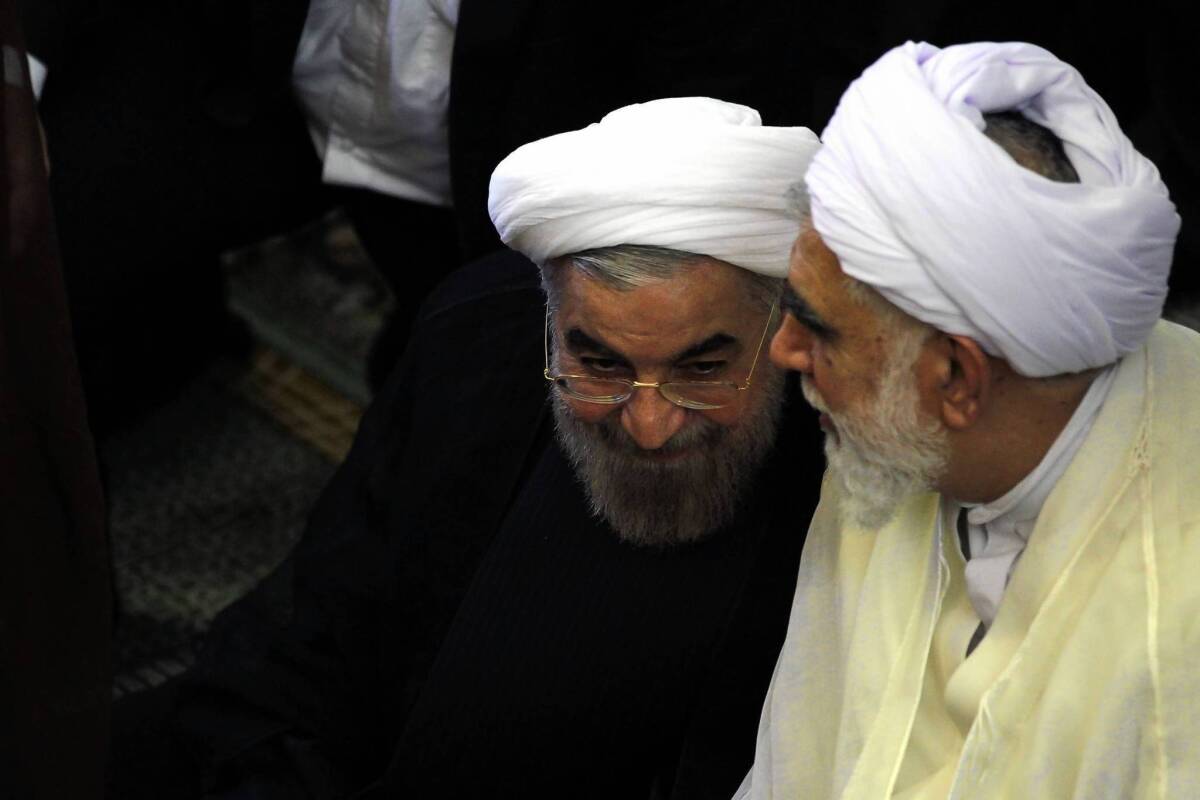U.S. resists pressure to offer a new nuclear deal to Iran

- Share via
WASHINGTON — The Obama administration is rejecting calls for it to offer a bold diplomatic proposal to Iran in hopes of breaking the long stalemate over Tehran’s controversial nuclear program.
Despite the urging of some former top U.S. officials and foreign diplomats for an aggressive new U.S. initiative, a senior official said the administration would not revise its latest proposal and instead was looking for a more positive response from Iran’s government, which will soon be led by the more moderate president-elect, Hassan Rouhani.
“We have a proposal on the table,” the American official, who did not want to be identified because of the sensitivity of the issue, told a group of reporters. “We are waiting for a serious proposal back.... At the end of the day, the onus is on Iran.”
Rouhani’s unexpected election victory last month has raised hope that Iran will finally be willing to consider a deal after years without progress. Rouhani has been critical of the outgoing government’s uncompromising approach on nuclear development, which Iranian officials say is strictly for civilian purposes. The U.S. and its allies believe Tehran is seeking to develop nuclear weapons.
A chorus of voices, including two former nuclear advisors to President Obama, has urged the White House to make an offer to rekindle talks to avoid squandering a rare opportunity for progress. The White House has threatened to consider military options if can’t find a diplomatic way to prevent Iran from acquiring nuclear weapons capability.
The experts and diplomats are urging the administration to press for direct U.S.-Iranian talks, rather than a return to the previous six-nation talks. They also urge the White House to offer Tehran a more comprehensive deal than the sort of short-term proposals that have been discussed in recent years.
Some contend that the U.S. should offer Iran relief from crushing economic sanctions now in place, in hope of providing an incentive for it to cooperate in curbing its nuclear program.
But the senior administration official said there was no need to float any such initiatives, because Iran is aware of all such avenues.
“Quite frankly, those options are already on the table with the Iranians.... They know that,” the official said.
The debate about the U.S. approach has been intensifying because of expectations that the six-party talks will resume in September, after Rouhani has taken office.
Many experts see these upcoming talks as crucial, because they believe that Iran may have the capability to build a bomb as early as next summer. Administration officials believe Iran is not that close to the weapons threshold, though they acknowledge that it is making progress and say negotiations cannot continue indefinitely.
Robert Einhorn, who was a member of the administration’s Iran team earlier this year, said that while there are reasons for the administration to take a cautious approach, U.S. officials will have more ability to shape events by taking the initiative.
“There’s a natural tendency for bureaucracies … to be cautious and want to see if the other side is serious,” said Einhorn, who was a State Department special advisor for nonproliferation and arms control. “But we have to be a bit more proactive.”
Like Soviet officials, Iranian officials tend to be slow-moving and hidebound, and they find it easier to react to U.S. proposals than to initiate their own, said Einhorn, who is now with the Brookings Institution. A proposal from the Iranians is likely to be a “a compromise that won’t be very satisfying,” he said.
Experts said that although there are reasonable tactical reasons for the White House to avoid making a first move, there is also a political reason.
Since Rouhani’s election, American political conservatives have been warning that he is not a genuine moderate, but a passionate supporter of the nuclear program — a “wolf in sheep’s clothing.” Obama’s conservative political foes are likely to harshly criticize the administration if it appears too eager to find compromise with Tehran, experts said.
But Gary Samore, who served as the White House’s top counterproliferation official until January, believes the administration should push “very aggressively” for U.S.-Iran talks and should offer a comprehensive nuclear deal.
“At this point it makes sense to really test whether Rouhani’s election means anything,” said Samore, now executive director for research at the Belfer Center at Harvard’s Kennedy School of Government.
He said that although he has doubts that the Iranians will cooperate, a test of their willingness would allow the United States to show other world powers it is Iran that is standing in the way of a deal. That would open the door to the administration moving ahead with additional tough economic sanctions, following the pattern of recent years, he said.
More to Read
Sign up for Essential California
The most important California stories and recommendations in your inbox every morning.
You may occasionally receive promotional content from the Los Angeles Times.











